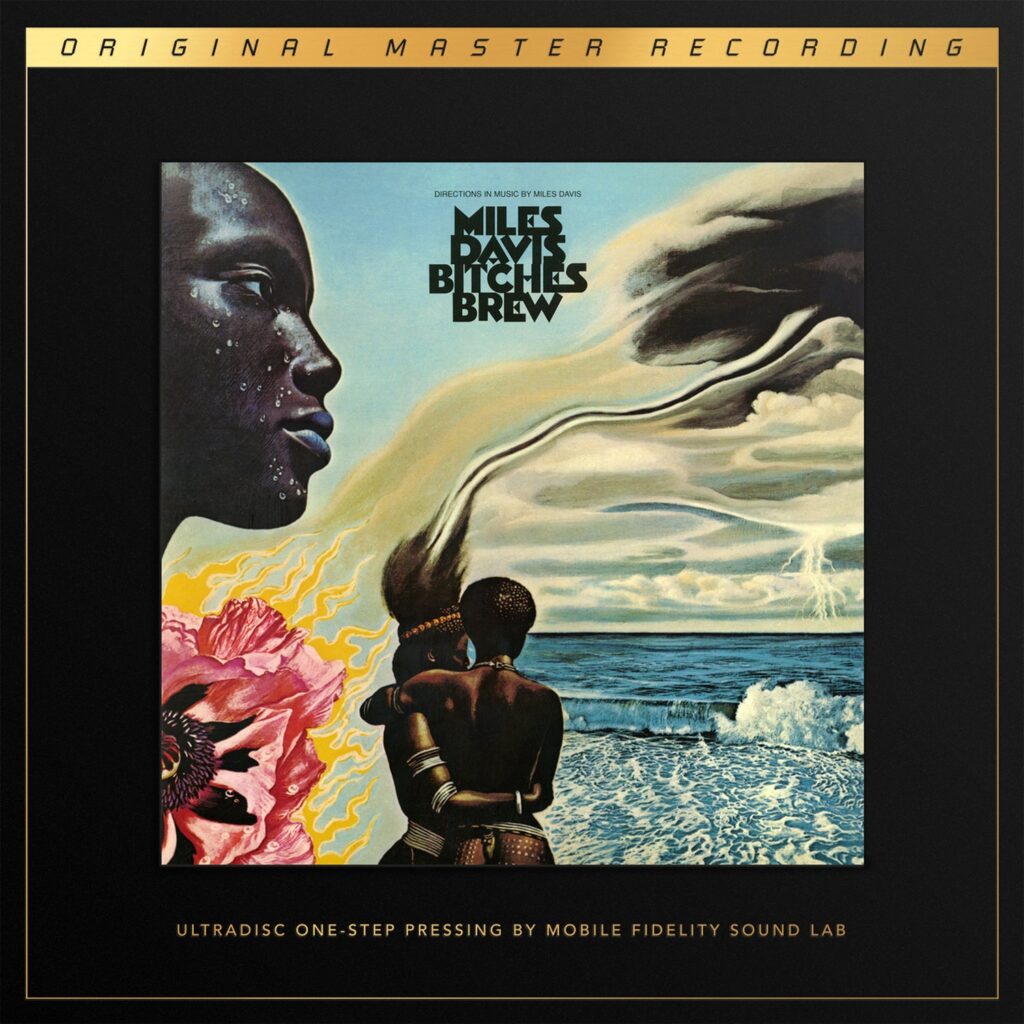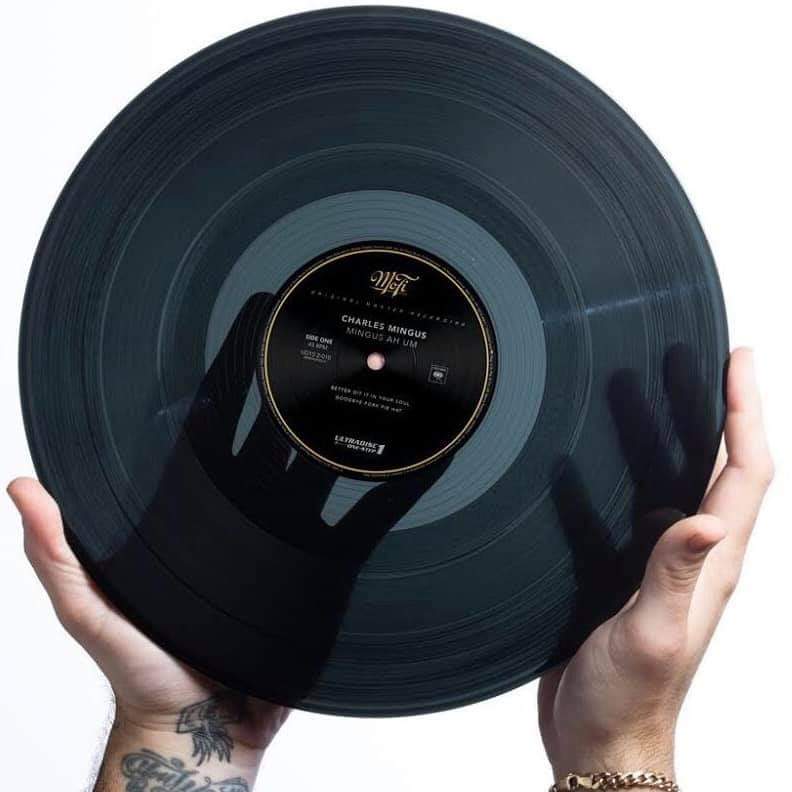
March 3, 2025 Update: MoFi has made the One-Step 2 LP 33 RPM Bitches Brew available for Pre-Order again: https://mofi.com/vinyl/miles-davis-bitches-brew-lmt-ed-ultradisc-one-step-33rpm-vinyl-2lp-box-set/
Also, it appears that it won’t be pressed on SuperVinyl, which is pretty strange considering the hype they have about SuperVinyl. Here is the quote from the order page:
Why Isn’t This UD1S Pressed on MoFi SuperVinyl?
Bitches Brew is one of the few Mobile Fidelity Sound Lab UltraDisc One-Step releases since the advent of MoFi SuperVinyl that is pressed on 180g black vinyl rather than MoFi SuperVinyl. Why? Quite simply, it sounds better on 180g black vinyl. After closely auditioning Bitches Brew on several different vinyl profiles — a time-consuming and expensive endeavor no other label pursues — MoFi’s expert engineers determined the music on this 1970 album translates with superior definition, clarity, presence, dynamics, and balance on this format. The opening of MoFi’s sister plant, Fidelity Record Pressing — and its peerless ability to press dead-quiet 180g black vinyl — means the label’s engineers now have more options when it comes to high-quality vinyl. All of which benefits the original artists and their intent, and you, the listener.
July 28, 2022 Update : With the recent events surrounding “MoFiGate” I’m updating this article from January 23, 2022 with details recently revealed.
It has come to light that Mobile Fidelity Soundlabs has, in some situations, been making a digital copy of the original masters that they have access to for their “Original Master Recording” releases and their One-Step releases. Mobile Fidelity has issued an apology for this lack of transparency and has started to implement descriptions on their website to improve clarity about the sources used. As it applies to the upcoming Bitches Brew One-Step, it explains some things (it is confirmed a digital copy), but still doesn’t tell us what the source master tape is, so I’m still hoping they’ll make a statement about this. Continue on for the updated version of the original article.
In January 2022, Mobile Fidelity Sound Lab announced their next titles to be released as part of their Ultradisc One-Step program. In this list were two Miles Davis titles, Sketches of Spain as a 2 LP 45 RPM release and a 33 RPM 2 LP release of his 1970 jazz fusion masterwork Bitches Brew.
I’ve covered Bitches Brew quite a bit in these pages, so I won’t cover the complete history of the album’s creation here. I recommend reading my coverage of the Bitches Brew sessions in my article about the RSD Double Image release of outtakes. The interesting thing about this release is that MoFi says that this release is mastered from the original tapes (I’ll get into this later). This is pretty much the M.O. for Mobile Fidelity: get the best versions of the original analog (or digital) tapes for a release and then create the best possible high fidelity audiophile release. Often this involves restoring these original tapes, thus preserving them for future reissues. In the case of the One-Step releases, they get a custom box set treatment and are pressed on vinyl that is a proprietary formula known as “Super Vinyl.”
NOTE: SEE MARCH 3, 2025 UPDATE ABOVE. BITCHES BREW IS NOW NOT ON SUPER VINYL.
From a post on their Facebook page:
“MoFi SuperVinyl is a new proprietary compound developed by NEOTECH and RTI to address two specific areas of improvement: noise floor reduction and enhanced groove definition. The vinyl composition features a new carbonless dye (hold the disc up to the light and see) and produces the world’s quietest surfaces. This high-definition formula also allows for the creation of cleaner grooves that are indistinguishable from the original lacquer. Mobile Fidelity Sound Lab feels SuperVinyl provides the closest approximation of what we hear in the mastering lab.”
September 28, 2021 Post to Mobile Fidelity Sound Lab Facebook page

Beyond the vinyl composition, there is the One-Step process itself, which is an attempt to create a record as close as possible to the original master by removing the typical three steps involved in creating additional copies to provide a way to create additional stampers as they wear out over the lifetime of the plates. The creation of the additional copies adds a small bit of loss in fidelity. Here is what MoFi says about this (Updated in July 2022):
Instead of utilizing the industry-standard three-step lacquer process, Mobile Fidelity Sound Lab’s new UltraDisc One-Step (UD1S) uses only one step, bypassing two processes of generational loss. While three-step processing is designed for optimum yield and efficiency, UD1S is created for the ultimate in sound quality. Just as Mobile Fidelity pioneered the UHQR (Ultra High-Quality Record) with JVC in the 1980s, UD1S again represents another state-of-the-art advance in the record-manufacturing process. MFSL engineers begin with the original master tapes, painstakingly transfer them to DSD 256, and meticulously cut a set of lacquers. These lacquers are used to create a very fragile, pristine UD1S stamper called a “convert.” Delicate “converts” are then formed into the actual record stampers, producing a final product that literally and figuratively brings you closer to the music. By skipping the additional steps of pulling another positive and an additional negative, as done in the three-step process used in standard pressings, UD1S produces a final LP with the lowest noise floor possible today. The removal of the additional two steps of generational loss in the plating process reveals tremendous amounts of extra musical detail and dynamics, which are otherwise lost due to the standard copying process. The exclusive nature of these very limited pressings guarantees that every UD1S pressing serves as an immaculate replica of the lacquer sourced directly from the original master tape. Every conceivable aspect of vinyl production is optimized to produce the most perfect record album available today.
From mobile fidelity’s website on the bitches brew One-step. emphasis mine.
One notable discrepancy here is that this description says the copy made is DSD 256, but the description above it on the webpage says the source is “1/4″ / 15 IPS analog master to DSD 64.” This is maybe a result of the use of stock copy, but they should fix this.
What Master Was Used?
The 4 CD boxset titled The Complete Bitches Brew was released in 1998. In addition to taking some creative liberties by including music from sessions that were not part of the Bitches Brew proper, the decision was made to remix the original Bitches Brew album, which required the recreation of Teo Macero’s original edits of the album. In an interview with Davis biographer Paul Tingen, Producer Bob Belden said the reason for this was twofold. First, they wanted to have a consistent sound across all of the music so all of the recordings needed to be addressed. There were disparities in the LP mixes of the material that had been released on albums like Big Fun, Circle in the Round and Live-Evil, and the a lot of the outtakes had never been mixed before. Secondly, the two-track masters had not aged well. Session engineer Mark Wilder elaborated, “So, we could either work with inferior tape copies from other countries, or go back to the original eight tracks and re-mix them, and so save ourselves a generation. The decision was made to re-mix from the original multitracks, just like with the Miles & Gil and Quintet boxed sets.”
The information available about the Mobile Fidelity Original Master Recording One-Step of Bitches Brew says only that it was mastered from “the original master tapes,” but we don’t know if that is based on the 1998 remix upon which all of the subsequent Sony releases have been made. The 2014 Mobile Fidelity Original Master Recording, which was reissued recently and according to discogs.com pricing is currently selling for around $60 may also be based on this same 1998 remix. The 2014 release was created by MoFi in-house engineers Kreig Wunderlich and Shawn Britton.
Since this uses a different process to create the records, it stands to reason that there will need to be new mechanicals created from the master tapes– lacquers, stampers and converts. None of the parts used for the 2014 release would be used for this. Which brings us to the tape used to make these parts. I couldn’t find any direct reference to what Wunderlich and Britton did to create a master tape for the 2014 release.
My opinion and speculation is that since Sony decided that the original 1970 master tapes were unusable for their own releases, they wouldn’t likely give any reissue label access to anything other than masters from the new mixes they created.
Reading about the work that Acoustic Sounds did for the recent UHQR Kind of Blue we know that Bernie Grundman created a copy of the vault masters for Kind of Blue in the 1990’s for Classic Recordings (which Acoustic Sounds bought) and this was used for the UHQR rather than go back to the vault. Considering that Mobile Fidelity was in a similar situation, they presumably acquired master tapes for the 2014 release and created their own DSD copy. Many reviews online say that the Original Master Recording releases (both the 2 LP and the SACD versions) are superior to the original releases of Bitches Brew, so my hopes are high for this release sounding fantastic. I would love to hear more about the tape used for the master. Was it, to quote Wilder, an “inferior tape copy from another country” or was it another source?
Even over 50 years after the release of Miles Davis’s Bitches Brew its importance to the history of recorded jazz is undisputed, though certainly not universally loved. It’s place in the pantheon of jazz contributes to the interest in preserving it and creating new editions of it. One could argue that the 1998 remix is a different album than the original 1970 album created by Davis and Macero, and if this is what Mobile Fidelity used in 2014 and for this One-Step, how will this be received by the community at large? Nevertheless, I’m interested to hear and see this new reissue done by one of the premiere reissue labels.
You can pre-order the Mobile Fidelity Sound Labs One-Step for Bitches Brew either from Mobile Fidelity or any number of other places online like Music Direct. The MSRP on it is $125.
Note: I’ll update this article if there is any additional information about the source tapes for this release.

